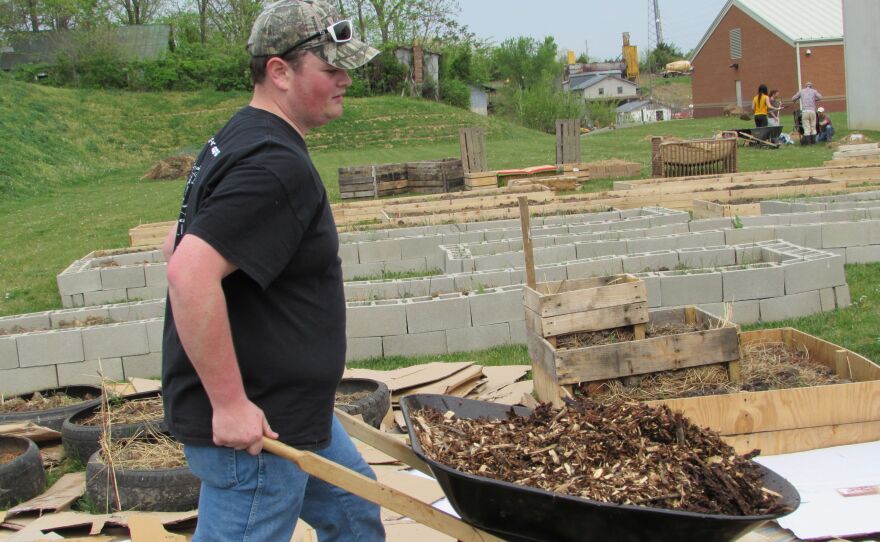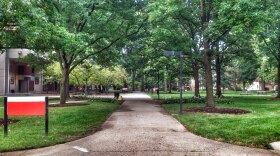Gardening season at one Kentucky jail means more than the physical and mental refreshment that comes with digging, planting and enjoying fresh vegetables.
A Western Kentucky University sociology course is bringing students from the Glasgow campus to dig side-by-side with students who are inmates at the detention center. More than asparagus and potatoes are taking root at the jail garden.
Some of the students are growing new lives.
Two dozen college students recently shoveled a mountain of mulch into wheelbarrows at the Barren County Detention Center. They could be any group of college students enrolled in this hands-on course from Western Kentucky University called The Sociology of Agriculture and Food. But five of the young women are wearing bright orange T-shirts .
They’re the inmates.
One of them is 26-year-old Heather Griffith. She says the jail garden is helping her look toward the future.
“It’s lifted my spirits because it’s given me something productive to do,” said Griffith. Her mother and father died while she was in jail. When she gets out, Griffith says she hopes to work toward doing cancer research.
WKU Sociology Professor Nicole Breazeale created the course. She’s not surprised that Griffith has found motivation for a better life. Breazeale says part of the curriculum is having students write about their relationship to food.
“A lot of people have struggled with access to healthy food,” Breazeale said. “A lot of people have struggled with obesity and high rates of cancer in their family, which they see as a link to not being able to have access to the fresh foods that their parents and their grandparents ate.”
Breazeale said the course involves more than a dozen community partners. The goal is to create both sustainable agriculture and sustainable relationships.
“There is also a very strong history in this region of self-provisioning, meaning growing food for yourself, or hunting and fishing, etc. So what we’re trying to do is build on the assets of this community, to try to enhance people’s ability, skills and knowledge about how to be able to produce food for themselves, and how to work together to try to solve some of the issues of hunger and diet-related disease in this area.”
Thirty-four-year-old Brandi Snodgrass was married to a military veteran, had an infant and no car when money was so tight that she got desperate. She began stealing to feed her family.
“We ended up in a situation where we were homeless and in the streets. We fell into some bad patterns with substance abuse,”Snodgrass said. “I overdosed on hallucinogens and while I was in the ambulance I thought the paramedic was trying to harm me and I ended up punching her and caught an assault charge for that.”
Snodgrass said she’s been through a lot of programs that have helped her understand how to create a better life, and the gardening program brought it all together.
“This garden program has changed my life forever,” says Snodgrass. “The sociology part of it, along with just working outside growing things, the connections I found with people.”
Snodgrass just been accepted into a six-month transitional program and is applying to college. She wants to help others in tough situations make good choices.
“So that’s what I’ll be working to change is to make sure people don’t have to go through them same uncertainties,” she says. “That there’s somebody there to help them along the way, so they don’t have to turn to drugs or alcohol or do criminal activities in order to make it.”
Detention Center Deputy Samantha Johnson is also a student in the WKU sociology class. She just finished her bachelor’s degree and is starting on her master’s degree in criminology. Johnson says the program helps inmates get a healthy perspective on life.
“The biggest change we’ve seen is their accountability for their own behavior,” says Johnson. “They realize through the support of the outside students, which are the Western Kentucky students, forming relationships, it’s helping them work through some of the troubles they’ve been through in their past.”
Johnson will teach this course next fall for the inmates. She says the goal is for those inmates to grow vegetables and partnerships that will nourish their lives and make them part of a healthy community.








